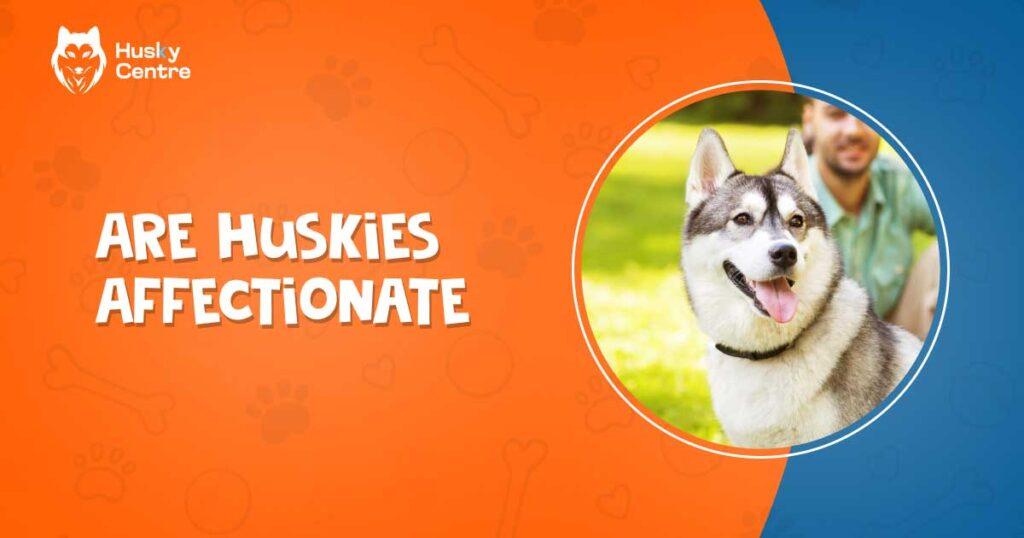Yes, Huskies are affectionate dogs. They love to bond with their families and enjoy human interaction.
Huskies are known for their friendly and loving nature. These dogs form strong bonds with their human families. They often seek attention and enjoy being around people. Their social nature makes them great family pets. Huskies are also playful and energetic, thriving in active households.
Their affectionate demeanor is coupled with a need for mental and physical stimulation. Providing enough exercise and interaction helps maintain their cheerful disposition. They can be vocal, expressing their emotions through howls and barks. This breed’s affectionate personality is one of the many traits that make them popular among dog lovers.
Understanding Husky Temperament
Are huskies affectionate? Many potential owners ask this question. Huskies are beautiful, intelligent, and strong dogs. Understanding husky temperament helps answer if they are affectionate.
Huskies have unique instincts and personality traits. This helps understand their behavior and affection levels.
Natural Instincts
Huskies have strong natural instincts. These instincts come from their ancestors, the Siberian Huskies. These dogs were bred for sledding and hunting. This gives huskies a high energy level and strong prey drive.
Huskies love to run and explore. They need a lot of exercise to stay happy. Without enough exercise, they can become bored and destructive.
- High Energy: Huskies need daily exercise.
- Prey Drive: Huskies may chase small animals.
- Pack Mentality: Huskies see their family as their pack.
Huskies are pack animals. They enjoy being around other dogs and people. This means they can be very social and affectionate. But they need to see their owner as the pack leader. This helps them feel safe and secure.
Understanding these instincts is key to understanding a husky’s temperament. Owners need to provide exercise, socialization, and leadership. This will help a husky feel happy and affectionate.
Personality Traits
Huskies have unique personality traits. These traits can affect their affection levels. Huskies are known for being independent and stubborn. They like to do things their own way.
But huskies are also very friendly and social. They love meeting new people and dogs. This makes them great family pets.
| Trait | Description |
| Independence | Huskies like to explore and do things alone. |
| Stubbornness | Huskies can be hard to train. |
| Friendliness | Huskies love meeting new people and dogs. |
Huskies are also very playful. They enjoy games and activities. This makes them fun companions. They are loyal to their family and enjoy spending time with them.
Huskies show affection in different ways. They may lean against you, lick you, or follow you around. They may not always be cuddly, but they show love in their own way.
Understanding these personality traits helps owners build a strong bond with their husky. It helps them understand how their husky shows affection.
Signs Of Affection In Huskies
Huskies are known for their striking appearance and energetic nature. But are Huskies affectionate? Understanding the signs of affection in Huskies can help you build a stronger bond with your furry friend.
These signs can be classified into three main categories: physical affection, emotional bonding, and social behaviors.
Physical Affection
Huskies often show their love through physical gestures. They might lean against you, follow you around, or even rest their head on your lap.
These actions are their way of saying, “I trust you and I feel safe with you.”
Here are some common physical signs of affection in Huskies:
- Leaning: Huskies will lean against you to show trust.
- Following: They follow you around the house.
- Resting their head: They place their head on your lap or shoulder.
- Licking: Huskies may lick your hands or face to show love.
- Snuggling: They snuggle up to you during nap times.
Physical affection is a clear sign that your Husky feels connected to you. They use their bodies to express their emotions and build a deeper bond with you.
Emotional Bonding
Emotional bonding with Huskies goes beyond physical gestures. They develop a deep emotional connection with their owners.
They may look into your eyes with a soft gaze, which is a sign of love and trust.
Key indicators of emotional bonding include:
| Behavior | Meaning |
| Soft gaze | Shows trust and love |
| Excitement on seeing you | Indicates happiness and attachment |
| Separation anxiety | Shows they miss you |
| Relaxed body language | Indicates comfort and security |
These emotional signs reflect a deeper connection. Your Husky relies on you for emotional support and companionship. This emotional bond is crucial for their well-being.
Social Behaviors
Huskies are social animals. They thrive on interaction and companionship. They often display social behaviors to show their affection. For example, they might bring you their favorite toy or initiate playtime.
Some social behaviors that indicate affection include:
- Bringing toys: Offering toys is a sign of wanting to share and bond.
- Initiating play: They start play sessions to engage with you.
- Vocalizing: Huskies are known for their unique vocalizations. They “talk” to you as a form of social interaction.
- Staying close: They prefer to stay in the same room as you, showing they value your company.
These social behaviors demonstrate that your Husky enjoys your presence. They seek interaction and connection, reinforcing the bond between you and your furry friend.
Factors Influencing Husky Affection
Huskies are known for their striking looks and energetic nature. But are they affectionate? The level of affection in Huskies can vary based on several factors.
Understanding these factors can help you foster a loving relationship with your furry friend. Here, we will explore the key factors influencing Husky affection.
Training And Socialization
Training and socialization play a crucial role in a Husky’s affection level. Proper training helps Huskies understand how to behave around humans. Early socialization ensures they are comfortable with different people and environments.
Important training tips include:
- Start training early to establish good behavior.
- Use positive reinforcement techniques like treats and praise.
- Introduce your Husky to various social settings and people.
Socialization should begin when the Husky is a puppy. Expose them to different experiences and environments. This helps them become well-adjusted adults.
Training classes can be beneficial. They provide a structured environment for learning and socialization. A well-trained Husky is more likely to be affectionate and well-behaved.
Individual Personality
Each Husky has a unique personality. Some are naturally more affectionate than others. Understanding your Husky’s personality can help you better cater to their needs.
Key personality traits to consider:
- Energy levels: High-energy Huskies may show affection through play.
- Temperament: Some Huskies are naturally more reserved.
- Past experiences: Rescue Huskies may have trust issues.
Pay attention to your Husky’s behavior. Some may prefer cuddles, while others show affection in different ways.
Observing their reactions to different situations can provide insights into their preferences. Adapting to their unique personality can help strengthen your bond.
Environment And Lifestyle
The environment and lifestyle you provide can greatly influence a Husky’s affection. A happy, healthy Husky is more likely to be affectionate.
Factors to consider include:
| Factor | Impact |
| Living space | Huskies need space to run and play. |
| Exercise | Regular exercise keeps them happy and healthy. |
| Routine | Consistency helps them feel secure. |
Ensure your Husky has enough physical and mental stimulation. Daily walks, playtime, and engaging activities are essential. A well-exercised Husky is less likely to display negative behaviors.
A loving home environment fosters affection. Make sure your Husky feels safe and loved. This encourages them to reciprocate the affection.
Tips For Building A Strong Bond With Your Husky
Huskies are known for their striking appearance and energetic nature, but are they affectionate? Indeed, they are!
Building a strong bond with your Husky involves understanding their unique traits and needs. Here are some tips to help create a loving and trusting relationship with your furry friend.
Positive Reinforcement
Positive reinforcement is essential to building a strong bond with your Husky. This method involves rewarding your dog for good behavior rather than punishing them for bad behavior. Huskies respond well to this approach because they are intelligent and eager to please.
- Use treats: Offer small treats as rewards for obedience and good behavior.
- Verbal praise: Use a happy, enthusiastic tone to praise your Husky.
- Physical affection: Petting and cuddling can be great motivators.
Training sessions should be short and frequent. Huskies have a short attention span, so keep sessions to 10-15 minutes. Consistency is key; make sure you reward the desired behavior immediately.
| Behavior | Reward |
| Sitting on command | Treat and praise |
| Coming when called | Treat and playtime |
| Staying calm | Petting and soothing words |
Quality Time And Interaction
Spending quality time with your Husky is crucial for bonding. These dogs are social and thrive on interaction. Here are some activities that can help strengthen your relationship:
- Daily walks: Huskies have high energy levels and need regular exercise.
- Playtime: Engage in games like fetch, tug-of-war, or hide-and-seek.
- Training sessions: Teach new tricks or commands to keep their minds active.
Interactive toys can also be beneficial. Puzzle toys and treat dispensers keep your Husky entertained and mentally stimulated. These activities not only keep your Husky happy but also reinforce your role as a loving and attentive owner.
During your time together, make eye contact and use a gentle voice. This helps your Husky feel secure and loved.
Regular grooming sessions can also be a bonding experience. Brush their coat and check their ears and paws, making it a routine they look forward to.
Understanding And Patience
Understanding your Husky’s unique personality and showing patience is vital. Each Husky is different, and what works for one may not work for another.
Pay attention to their body language and behavior to understand their needs and emotions.
- Observe: Notice what makes your Husky happy or anxious.
- Adapt: Adjust your approach based on their reactions.
- Stay calm: Patience is key, especially during training sessions.
Huskies can be stubborn, so it’s important to remain calm and consistent. Avoid getting frustrated or raising your voice. Positive reinforcement works best when paired with a calm and patient demeanor.
Building trust takes time. Give your Husky space when needed and don’t rush the bonding process.
Celebrate small victories and progress, no matter how minor. Over time, your patience and understanding will lead to a deep, affectionate bond with your Husky.
Frequently Asked Questions
Do Huskies Get Attached To Owners?
Yes, Huskies can get attached to their owners. They are loyal, affectionate, and enjoy spending time with their family.
Are Huskies Usually Cuddly?
Huskies can be cuddly, but it varies by individual. Some are affectionate, while others are more independent. Socialization helps.
Are Huskies Clingy?
Huskies are generally not clingy. They are independent and enjoy exploring. They need social interaction but also value their space.
How Do Huskies Show Affection?
Huskies show affection by licking, cuddling, and leaning against you. They also wag their tails and give gentle nuzzles.
Conclusion
Huskies are affectionate and form strong bonds with their owners. They love to play and show loyalty. With proper training and socialization, their affectionate nature shines. If you’re seeking a loving and playful companion, a Husky might be the perfect choice for you. Enjoy the journey with your furry friend!


Meet Jarred, the heart and soul behind HukyCentre. With a deep affection for furry friends, he pours his passion into every word he writes. His genuine love for dogs shines through in his engaging and informative content. As a dedicated dog enthusiast, Jarred’s goal is to share valuable insights and tips that resonate with fellow dog lovers. Join Jarred on the journey as he celebrates the joy and companionship that dogs bring into our lives.



